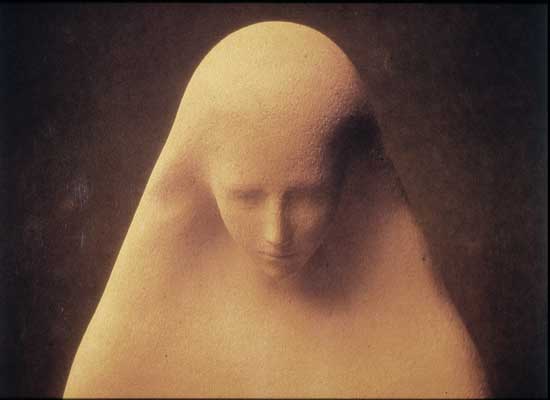
Ave Cerquetti, ‘Mater Christi’ – Rome, 1971
“
Mary is not easily understood even though she is greatly loved. In a heart that is far from God, one is more likely to find devotion to her than to Jesus. She is universally loved and the reason is this:
Mary is a Mother. Mothers, in general, are not “understood,” they are loved, especially by younger children. Not infrequently, indeed often, one hears that an eighty year-old man died saying as his last word, “mother.” A mother is more the object of the heart’s intuition than of the mind’s speculation. She is more poetry than philosophy, because she is too real and profound, close to the human heart.
So it is with Mary, the Mother of mothers, who the sum of all the affection, goodness, and mercy of all the mothers in the world cannot manage to equal. Jesus, in a certain sense, stands
before us more: his divine and splendid words are too different from ours to be confused with them. Indeed, his words are a sign of contradiction.
Mary is peaceful like nature, pure, serene, clear, temperate and beautiful — the nature that is distant from the world, in the mountains, in the open countryside, by the sea, in the blue sky or the starry heavens. She is strong, vigorous, harmonious, consistent, unyielding, rich in hope, for in nature life springs up perennially bountiful, adorned with the fragrant beauty of flowers, generous in the abundance of its fruits.
Mary is too simple and too close to us to be “contemplated”. She is “sung” by hearts that are pure and in love, who express what is best in them in that way. She brings the divine to earth as gently as a heavenly inclined plane from the dizzying heights of heaven to the infinite smallness of creatures. She is the Mother of all and of each human being. She alone knows how to burble and smile at her child in such a way that, even though it is small, each one knows how to enjoy her caress and respond with their love to
that love.
Mary is not understood because she is too close to us. She, who was destined from eternity to bring graces, her Son’s divine jewels, is there, near us and she waits, always hoping for us to notice her gaze and accept her gifts.
If anyone is fortunate enough to understand her, she carries them off to her kingdom of peace, where Jesus is King, and the Holy Spirit is the life-breath of that heaven. There, purified of our dross and illuminated in our darkness, we will contemplate her and enjoy her, an added paradise, a paradise apart. Here, let us be found worthy of being called along “her way” and thus avoid staying immature in spirit, with a love that does not go beyond supplication, petition, request and self-interest, but rather, knowing her a little, may we glorify her.” See also
Chiara Lubich, “
Mary, Transparency of God” New City Press, 2003 p86-88
0 Comments